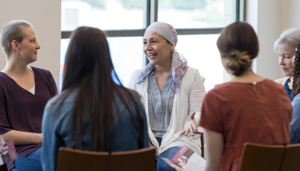
Recent reports from The CDC indicate over 1,000 lung injury cases and 18 deaths are related to e-cigarettes or vaping. Approximately 80 percent of patients are under 35 years old.
“Smoking and vaping, sadly these numbers are increasing daily and it often starts in the teen years,” said Mary Jo Henry, ARNP, UnityPoint Clinic – Multi-Specialty, tobacco treatment specialist. “Research suggests starting at such a young age places an imprint on the brain and this is felt to make it harder to quit later in life. Nicotine is a very addictive drug. Early use has consequences on the developing brain. There are just too many variables, and unknowns about the dual use of e-cigarettes.”
Help is Available
Henry says help is available for individuals looking to quit using tobacco, whether that is smoking or using e-cigarettes. When she meets patients that use tobacco, she uses a special questionnaire to determine how ready they are to quit. Once she gages readiness, she works to come up with a plan tailored to their individual needs.
Nicotine Replacement Therapy (NRT)
“The good news is there are more medications out there to help people quit using tobacco/nicotine than ever before. Unfortunately, there are a lot of misconceptions about nicotine replacement,” said Henry. “The nicotine patch, gum and lozenges are all effective at keeping individuals from the feelings of nicotine withdraw. These include feelings of anxiety, anxiousness, tremors, difficulty concentrating, sleeping, just to name a few. There are other medications also available.
The goal of nicotine replacement therapy (NRT) is to slowly taper individuals off nicotine. Use of NRT in place of smoking or vaping not only calms the nicotine withdrawal symptoms, they also eliminate the exposure to the thousands, of harmful chemicals known to be in cigarettes, which are likely to be in e-cigarettes as well. More research is needed to know this for sure.
Coping with Withdrawal Symptoms
In addition to using medications, Henry works with individuals on other ways to cope with the withdrawal symptoms such as changing routines, minimizing exposures to triggers to use tobacco, and planning for circumstances or situations that place an individual at high risk for relapse. She also encourages leaning on family and friends for support during the process.
“The medications are not magic,” states Henry. “You have to be ready and willing to commit to quit but using a combination of long and short acting medicines along with getting support has the highest success rate.”
UnityPoint Clinic Multi-Specialty & Nassif Community Cancer Center have teamed up for a free event aimed at individuals interested in learning more about how to quit smoking or vaping. It’s also available to parents of teens or young adults that use e-cigarettes on how they can support someone trying to kick the habit.
One Day to a Tobacco-Free Life – Great American Smokeout 2019
- Wed., Nov. 20, 2019 from 4-6:30 p.m.
- Nassif Community Cancer Center Cook Cancer Wellness Center, 202 10th St. SE, Cedar Rapids
- Free event, please register at unitypoint.org or call (319) 558-4876.







